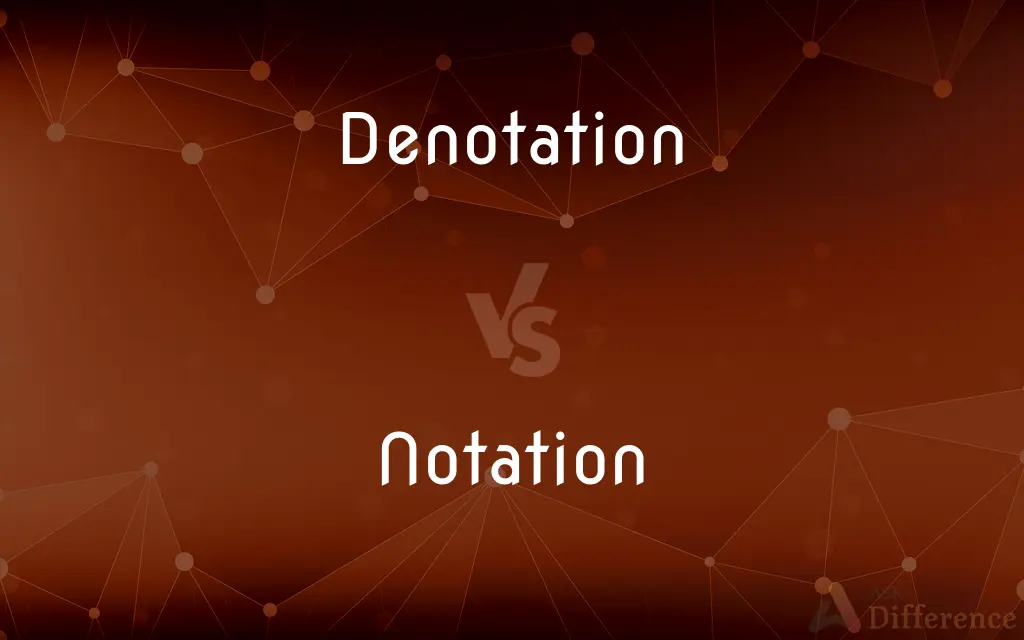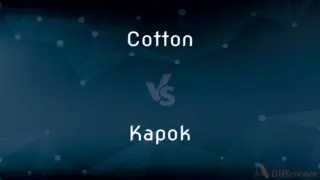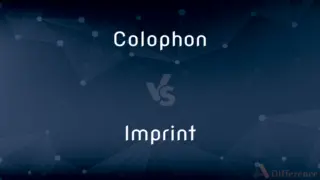Denotation vs. Notation — What's the Difference?
By Tayyaba Rehman & Fiza Rafique — Updated on March 29, 2024
Denotation refers to the literal meaning of a word, while notation involves symbols or signs in a specific system, such as mathematics or music.

Difference Between Denotation and Notation
Table of Contents
ADVERTISEMENT
Key Differences
Denotation is the direct, literal meaning of a word or term, the dictionary definition that is universally understood. Whereas, notation is a system of symbols or signs used to represent information in a specialized field, such as mathematics, music, or scientific formulas, focusing on conveying complex information efficiently.
Denotation provides clarity and a common understanding in communication, ensuring that a word means the same thing to everyone who reads or hears it. On the other hand, notation requires specific knowledge or education to understand and interpret the symbols, serving as a shorthand method for conveying detailed information within a particular field.
While denotation is crucial for clear verbal and written communication, allowing for precise and unambiguous expression, notation plays a vital role in technical, scientific, and artistic fields by enabling the concise representation of complex ideas and processes.
The usage of denotation is widespread across all languages and cultures, ensuring that communication is accessible and understood by a broad audience. In contrast, notation systems are often limited to those with specialized training or interest in a subject, such as mathematicians, musicians, or chemists.
Denotation remains constant across different contexts, ensuring stability in meaning. Whereas notation can vary significantly from one discipline to another, with symbols and their meanings changing based on the field of study.
ADVERTISEMENT
Comparison Chart
Definition
Literal meaning of a word
System of symbols or signs
Field
General language
Specialized fields (math, music, science)
Purpose
Clear communication
Efficient representation of complex ideas
Knowledge
Universal understanding
Requires specific knowledge or education
Variability
Constant across contexts
Varies by discipline
Compare with Definitions
Denotation
The explicit or direct meaning of a word.
The denotation of rose is a type of flower.
Notation
The method of writing music using symbols.
Musical notation allows composers to transcribe melodies.
Denotation
The objective meaning of a word.
The denotation of cat specifies a certain kind of mammal.
Notation
Symbols used to represent scientific concepts.
Chemical notation simplifies complex molecular structures.
Denotation
The dictionary definition of a term.
The denotation of blue refers to a color.
Notation
The use of signs in specialized fields.
Notation in choreography describes dance movements.
Denotation
The literal interpretation of a word.
In law, denotation of terms is critical for clarity.
Notation
A system of symbols in mathematics.
In notation, π represents Pi, a mathematical constant.
Denotation
The primary meaning without emotional association.
The denotation of heart is an organ in the body.
Notation
A way to denote actions or processes in computing.
Programming notation varies among different languages.
Denotation
Denotation is a translation of a sign to its meaning, precisely to its literal meaning, more or less like dictionaries try to define it. Denotation is sometimes contrasted to connotation, which includes associated meanings.
Notation
In linguistics and semiotics, a notation is a system of graphics or symbols, characters and abbreviated expressions, used (for example) in artistic and scientific disciplines to represent technical facts and quantities by convention. Therefore, a notation is a collection of related symbols that are each given an arbitrary meaning, created to facilitate structured communication within a domain knowledge or field of study.
Denotation
The literal or primary meaning of a word, in contrast to the feelings or ideas that the word suggests
Beyond their immediate denotation, the words have a connotative power
Notation
A series or system of written symbols used to represent numbers, amounts, or elements in something such as music or mathematics
Algebraic notation
New terminologies and notations
Denotation
The act of denoting; indication.
Notation
A note or annotation
He noticed the notations in the margin
Denotation
Something, such as a sign or symbol, that denotes.
Notation
Short for "scale of notation" (see scale)
Denotation
Something signified or referred to; a particular meaning of a symbol.
Notation
A system of figures or symbols used in a specialized field to represent numbers, quantities, tones, or values
Musical notation.
Denotation
The most specific or direct meaning of a word, in contrast to its figurative or associated meanings.
Notation
The act or process of using such a system.
Denotation
The act of denoting, or something (such as a symbol) that denotes
Notation
A brief note; an annotation
Marginal notations.
Denotation
The primary, surface, literal, or explicit meaning of a signifier such as a word, phrase, or symbol; that which a word denotes, as contrasted with its connotation; the aggregate or set of objects of which a word may be predicated.
The denotations of the two expressions "the morning star" and "the evening star" are the same (i.e. both expressions denote the planet Venus), but their connotations are different.
Notation
(uncountable) The act, process, method, or an instance of representing by a system or set of marks, signs, figures, or characters.
Denotation
The intension and extension of a word
Notation
(uncountable) A system of characters, symbols, or abbreviated expressions used in an art or science or in mathematics or logic to express technical facts or quantities.
This section lists all algebraic notation used in this book. (Using notations would be incorrect).
The notations used in the two books differed. (Using notation would be incorrect).
Denotation
(semantics) Something signified or referred to; a particular meaning of a symbol
Notation
(countable) A specific note or piece of information written in such a notation.
She made a notation in the margin of the book.
Denotation
(computer science) Any mathematical object which describes the meanings of expressions from the languages, formalized in the theory of denotational semantics
Notation
The act or practice of recording anything by marks, figures, or characters.
Denotation
(media studies) A first level of analysis: what the audience can visually see on a page. Denotation often refers to something literal, and avoids being a metaphor.
Notation
Any particular system of characters, symbols, or abbreviated expressions used in art or science, to express briefly technical facts, quantities, etc.
Denotation
The marking off or separation of anything.
Notation
Literal or etymological signification.
"Conscience" is a Latin word, and, according to the very notation of it, imports a double or joint knowledge.
Denotation
The act of indicating or pointing out by name
Notation
A technical system of symbols used to represent special things
Denotation
The most direct or specific meaning of a word or expression; the class of objects that an expression refers to;
The extension of `satellite of Mars' is the set containing only Demos and Phobos
Notation
A comment or instruction (usually added);
His notes were appended at the end of the article
He added a short notation to the address on the envelope
Notation
The activity of representing something by a special system of marks or characters
Common Curiosities
What is notation?
Notation is a system or set of symbols used to represent special things in various fields such as mathematics, music, or science.
How does denotation differ from connotation?
Denotation refers to the literal meaning of a word, whereas connotation involves the emotions or ideas that the word suggests.
Can the denotation of a word change over time?
While the denotation of a word is generally stable, it can evolve over time as language and usage patterns change.
What is denotation?
Denotation is the literal or primary meaning of a word, without the feelings or ideas that the word might suggest.
Why is notation important in mathematics?
Notation is crucial in mathematics because it provides a universal language for expressing mathematical ideas precisely and concisely.
How do educators teach notation in specialized fields?
Educators use examples, practice, and application to teach students how to understand and use notation in specialized fields.
Are there any fields where denotation and notation overlap?
In linguistics and semiotics, denotation and notation can overlap when discussing the representation of meaning through symbols.
How does notation aid in learning music?
Notation provides a visual representation of music, allowing musicians to understand and perform compositions accurately.
Can denotation vary by culture?
Denotation tends to be consistent within a language, but translations and cultural nuances can affect interpretation.
Is notation universal across all fields?
No, notation varies significantly across different fields, tailored to the needs and conventions of each discipline.
How do writers use denotation?
Writers use denotation to convey clear and direct meanings, ensuring their message is understood by the audience.
Why is precise notation important in science?
Precise notation in science ensures clear communication of complex data and theories, essential for research and understanding.
How can misunderstandings arise from denotation?
Misunderstandings can arise if a word has multiple denotations or if the intended denotation is not common knowledge.
What role does notation play in computer programming?
In programming, notation is used to define algorithms and operations in a manner that computers and humans can understand.
Can everyone understand musical notation?
Musical notation requires specific knowledge and training to read and interpret, so not everyone can understand it without learning.
Share Your Discovery

Previous Comparison
Cotton vs. Kapok
Next Comparison
Colophon vs. ImprintAuthor Spotlight
Written by
Tayyaba RehmanTayyaba Rehman is a distinguished writer, currently serving as a primary contributor to askdifference.com. As a researcher in semantics and etymology, Tayyaba's passion for the complexity of languages and their distinctions has found a perfect home on the platform. Tayyaba delves into the intricacies of language, distinguishing between commonly confused words and phrases, thereby providing clarity for readers worldwide.
Co-written by
Fiza RafiqueFiza Rafique is a skilled content writer at AskDifference.com, where she meticulously refines and enhances written pieces. Drawing from her vast editorial expertise, Fiza ensures clarity, accuracy, and precision in every article. Passionate about language, she continually seeks to elevate the quality of content for readers worldwide.














































